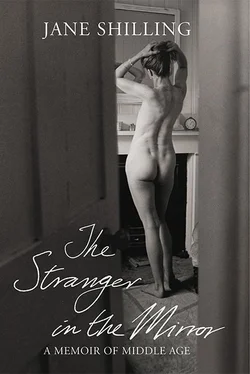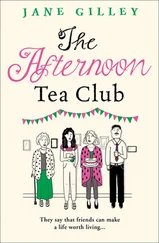This quality of gentillesse , unlike charm or beauty, isn’t a gift but a decision. You can train yourself to do it, if you wish, and often it provokes an answering echo from other people. Since my grandparents had died there had been little gentillesse in my close relationships. Only when my son was born had I discovered some unsuspected reserves of patience and niceness. Though they often failed and there were long, ugly stretches of intense disagreeableness, the periods of niceness were sustained enough for me to feel that I had a capacity for nurturing that wasn’t confined to plants and animals, and that when my son left home, I would find the loss of another person with whom to share my life desolating.
Plenty of middle-aged women, if the sprightly volumes on ‘second life’ were to be believed, found adequate outlets for their caring instincts in their pets, their gardens, their grandchildren, in self-improvement, artistic endeavour and good works. I had, myself, been keeping for quite a while a list of the many things with which I planned to fill the half longed-for, half dreaded, empty time after Alexander left home: an ambitious regime of language learning, travel (to the places where my new languages were spoken), books, concerts, galleries, charitable endeavour and domestic industry (a well stocked store cupboard, an orderly kitchen garden).
All this, plus the fact that I would certainly have to work for a living well into old age, since I had no savings and a negligible pension, meant that I wasn’t very afraid of suffering from the attacks of anomie to which mothers left behind in their empty nests were said to be prone. What’s more, I loved solitude; craved it, sometimes, with a desire as urgent as thirst. On the very rare occasions when Alexander was elsewhere, I relished it, not as an absence but as something more like a palpable sensation, like music, or poetry.
But that was, after all, as a contrast to the constant company of an entertaining male. I loved my solitude when he was gone because it was so rare and precious. And at the same time I missed his company. I liked the whiff of testosterone about the place. I liked hearing the story of his day and reporting the story of mine; I liked having someone to go to films with; someone with whom to anatomise the television dramas, soap operas and episodes of Top Gear for which he had infected me with his enthusiasm. I even, sometimes, quite liked having someone to cook and iron for.
I was, in a way, grateful for the things I made a fuss about: the barbarous tedium of football; the outrageous sexism of the girly posters on the wall. (Although were they, in fact, sexist? After delivering a stinging feminist lecture on the exploitation of women, I picked up one of his lads’ mags and discovered that half these semi-naked girls were enthusiastic volunteers, rather than professional glamour models. So now I wasn’t quite so sure of my position on naked breasts, especially not the ones belonging to Readers’ Girlfriends, oddly juxtaposed as they were in the lads’ mags with Readers’ Severed Fingers – blurred or all-too-clear snapshots of ghastly domestic accidents with chainsaws and strimmers.) Anyway, I had come to regard these things as a useful irritant; a means of ensuring that my life didn’t dwindle into miniature, enclosed, female preciousness.
Solitude, I noticed, was big in the accounts of how to make the best of a post-menopausal existence. The route to a serene, composed ‘second life’, according to these manuals, was to be found in a kind of ecstatic renunciation: a sloughing-off of the busy accumulations of the first part of life so as to enter into a mystical communion with yourself and Nature which would prove, if you got it right, much more satisfactory than the muddled and frustrating pre-menopausal courtship dance.
If the fertile years were all about narcissistic perfection of the body and the life, the post-fertile years, so the argument went, should involve a stripping away of the garish intrigues of desire, attraction, self-adornment, a discovery of one’s essential nature through a cleaving to the elemental: whether religious or some more inchoate sense of animist spirituality. The reward for the bitter travail endured by the ego in divesting itself of the trappings and stratagems and evasions of allure was to be a kind of innocence regained: a pure permeability to the eloquent, inanimate world of essence; a feeling of communion with the fragrant upturned clod in a ploughed field; the shrill aria of the ascending lark; the haze of green leaves budding beneath a washed spring sky.
Lovely though all this sounded in theory, I was not altogether convinced. The arguments about a relationship with nature as a more satisfying substitute for human attachment tended to be made, I noticed, by writers from an urban background: late converts to the virtues of pastoral. Those who already knew the countryside intimately, having grown up there, generally took a more sceptical view of nature worship.
In her writing on middle age, Colette often represents the experience of sexual passion as a malaise – a kind of fever for which there is no remedy, beyond that of waiting for it to burn itself out. She conflates the idea of the post-menopausal ‘convalescence’ from the fever of desire with a retreat from the poisoned sophistication of urban life to an asexual Eden, free from the sting of need and longing. But at the same time, the country-bred child in Colette understands that the redemptive power of nature is a wish: a story she tells herself, not a lifeline.
Another country-bred child, Lorna Sage, gives a pithy summary of the downside of ecstatic pastoral in Bad Blood , her memoir of a childhood in rural Wales: ‘Try as I might to lose myself in the landscape… I was still only an apprentice misfit and self-conscious in the part… The truth was that often no amount of trudging would get me to the state of dreamy abstraction I craved. Then I was simply lonely.…’
The childhood habit of mesmerising oneself with solitude was familiar to me. From my house to my primary school was a walk of about a mile. The route from our road of solid villas bordered with lime trees and flowering cherry dwindled after half a mile into farmland: arable fields smelling in autumn of newly turned earth, cherry and apple orchards, paddocks with sheep and grazing horses.
A quarter of a mile further on you came to the village of Tunstall. At the top of the hill, an ancient church of knapped flint and brick in a yew-shaded churchyard crowded with carious tombstones. Beyond the churchyard, the old rose-brick walls of Tunstall House, sown with toadflax and wallflowers. Through the iron spears of the gate you could just see the diamond shape of the clock, half masking the rectangular window frame into which it was set. A romantic ghost was attached to this house, an apocryphal story of forbidden love between a Puritan girl and a Cavalier soldier that ended with the girl’s being walled up in her room. Her shade, grey-clad, was supposed to walk on mid-summer’s eve.
The thought of the shut-inness of the ghostly girl in the dark room behind the clock, and the shut-outness of me, peering in through the iron-barred gate, disturbed me. I passed the old house with a foreboding sense of love turned dangerous, and was glad to find myself among the quieter dead of the churchyard.
At the end of a cinder path lay my primary school, a Victorian schoolhouse in pointy gingerbread Gothic, surrounded by a slew of mobile classrooms flighty as henhouses, a pungent block of spider-haunted outside lavatories overgrown by an enormous lilac tree, and a low, dank concrete building, once a wartime bomb shelter, now a store for wooden hoops, skipping ropes, bristly coir mats and the school maypole with its tangle of coloured ribbons. Beyond the classrooms, a hawthorn hedge; beyond the hedge, orchards as far as a child could see.
Читать дальше












